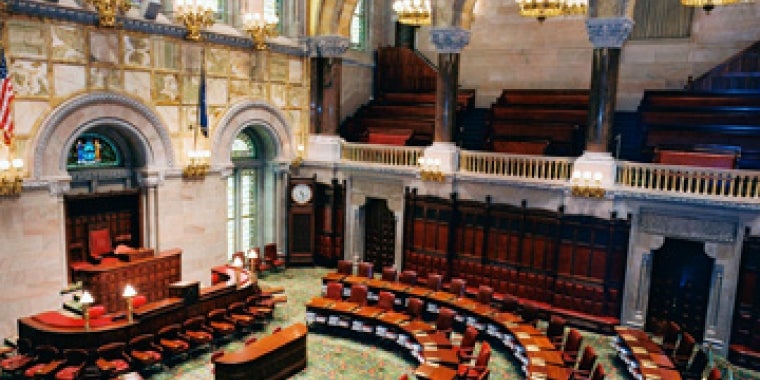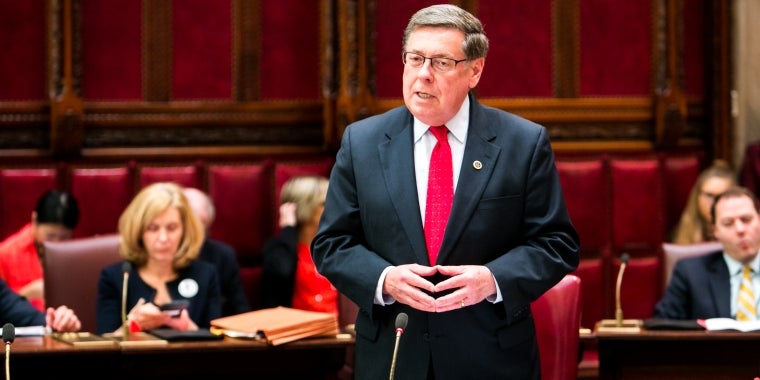
Senate To Act On Death Penalty Legislation

The Senate will act next weekonlegislation to correct a technical flaw inNew York'scapital punishment statute so that it withstands court muster, Senator James L. Seward said today. Legislation (S.2727) will be reported to the Senate floor thatwould amend the state's death penalty law to fix a provision that was ruled invalid by the state court of appeals.
"This legislation would address the concerns raised by the court to ensure that we have a capital punishment law on the books that can be used to protect New Yorkers and prevent dangerous, violent criminals from getting back on the streets," Senator Seward said. "A majority of New Yorkers support capital punishment and we believe it is a strong deterrent to violent crime, and statistics bear that out."
Since the death penalty was enacted in 1995, the number of murders in New York State decreased from 1,551 to 922 in 2003. The number of violent crimes dropped from 151,731 in 1995 to 89,316 in 2003.
At a Capitol news conference, senatorswere joined by Benjamin Nazario of Flushing, Queens, whose brother Ramon was one of five victims killed in the tragic shootings at a Wendy’s Restaurant in Flushing in May 2000. One of the two men convicted in the killings, John Taylor, was sentenced to death and the sentence is pending an appeal.
"The state assembly is dragging on the death penalty," Mr. Nazario said. "Anyone who takes someone’s life in cold blood deserves the death penalty and it should be the law in New York State."
Also speaking at the news conference was Debra Jaeger of Wheatfield, Niagara County. Her sister, Jill Russell-Cahill, was killed by her husband Jeff Cahill, whose death sentence was overturned in the controversial decision by the state court of appeals.
"We must have an effective death penalty law in place so other families will be spared the pain and suffering that our family has endured," Ms. Jaeger said. "A broken death penalty law only serves to victimize the victims and we must fix it now."
"The senate and the governor want to get the death penalty law back on the books; the assembly only wants to hold hearings and talk," Senate Majority Leader JosephBruno said. "Ten years ago the assembly passed death penalty legislation with 94 votes in support including Speaker Silver, I urge them to bring this bill, which includes language originally proposed by the assembly, before their house as soon as possible. If they brought it up for a vote, it would pass."
"Throughout the nation, New York’s capital murder statute has been known as a model that many states are utilizing as it incorporates unprecedented protections for capital defendants. It has always been a well-balanced law and it is a major reason why New York is one of the safest states in the entire country," said Senator Dale M. Volker. "Yet, the New York State Court of Appeals decided that portions of our capital punishment statute needs even more protections for the defendant. That is why the state senate will address the court of appeals' concerns and pass legislation that will reactivate the death penalty. The majority of New Yorkers have consistently supported the death penalty and today's announcement will ensure that the ultimate sentence for the most vile will be available for prosecutors to utilize."
The court ruled that under the law, judges were improperly required to instruct jurors in capital cases that if they deadlocked and failed to reach a verdict during the penalty phase of a trial, the judge would impose a sentence that would leave the defendant eligible for parole after 20 to 25 years.
This bill would require that in addition to capital punishment or life in prison without parole, juries would be given a third option of imposing a sentence of life in prison with the possibility of parole when sentencing convicted murderers.
If a jury is deadlocked, a sentence of life without parole would be imposed, and juries would be told of that provision before sentencing. All pending capital cases, as well as crimes committed prior to the effective date of any change in the law, would be affected by the changes included in this bill.
####



